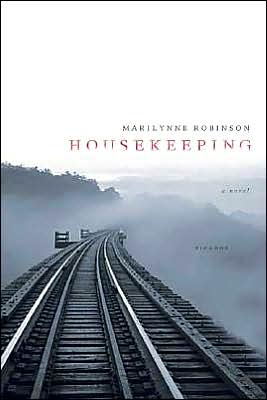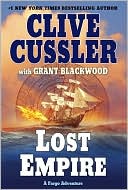Housekeeping
A modern classic, Housekeeping is the story of Ruth and her younger sister, Lucille, who grow up haphazardly, first under the care of their competent grandmother, then of two comically bumbling great-aunts, and finally of Sylvie, their eccentric and remote aunt. The family house is in the small Far West town of Fingerbone set on a glacial lake, the same lake where their grandfather died in a spectacular train wreck, and their mother drove off a cliff to her death. It is a town "chastened by...
Search in google:
Winner of the Pen/Hemingway AwardA modern classic, Housekeeping is the story of Ruth and her younger sister, Lucille, who grow up haphazardly, first under the care of their competent grandmother, then of two comically bumbling great-aunts, and finally of Sylvie, the eccentric and remote sister of their dead mother. The family house is in the small town of Fingerbone on a glacial lake in the Far West, the same lake where their grandfather died in a spectacular train wreck and their mother drove off a cliff to her death. It is a town "chastened by an outsized landscape and extravagant weather, and chastened again by an awareness that the whole of human history had occurred elsewhere." Ruth and Lucille's struggle toward adulthood beautifully illuminates the price of loss and survival, and the dangerous and deep undertow of transcience.Publishers WeeklyA reissue of the contemporary feminist classic. (Sept.)
\ \ Chapter One\ \ \ My name is Ruth. I grew up with my youngersister, Lucille, under the care of my grandmother, Mrs.Sylvia Foster, and when she died, of her sisters-in-law,Misses Lily and Nona Foster, and when they fled, ofher daughter, Mrs. Sylvia Fisher. Through all thesegenerations of elders we lived in one house, my grandmother'shouse, built for her by her husband, EdmundFoster, an employee of the railroad, who escaped thisworld years before I entered it. It was he who put usdown in this unlikely place. He had grown up in theMiddle West, in a house dug out of the ground, withwindows just at earth level and just at eye level, so thatfrom without, the house was a mere mound, no more ahuman stronghold than a grave, and from within, theperfect horizontality of the world in that place foreshortenedthe view so severely that the horizon seemedto circumscribe the sod house and nothing more. Somy grandfather began to read what he could find oftravel literature, journals of expeditions to the mountainsof Africa, to the Alps, the Andes, the Himalayas,the Rockies. He bought a box of colors and copied amagazine lithograph of a Japanese painting of Fujiyama.He painted many more mountains, none of them identifiable,if any of them were real. They were all suavecones or mounds, single or in heaps or clusters, green,brown, or white, depending on the season, but alwayssnowcapped, these caps being pink, white, or gold, dependingon the time of day. In one large painting he hadput a bell-shaped mountain in the very foreground andcovered it with meticulously painted trees, each of whichstood out at right angles to the ground, where it grewexactly as the nap stands outon folded plush. Every treebore bright fruit, and showy birds nested in the boughs,and every fruit and bird was plumb with the warp in theearth. Oversized beasts, spotted and striped, could beseen running unimpeded up the right side and unhasteneddown the left. Whether the genius of thispainting was ignorance or fancy I never could decide.\ One spring my grandfather quit his subterraneoushouse, walked to the railroad, and took a train west. Hetold the ticket agent that he wanted to go to the mountains,and the man arranged to have him put off here,which may not have been a malign joke, or a joke at all,since there are mountains, uncountable mountains, andwhere there are not mountains there are hills. The terrainon which the town itself is built is relatively level,having once belonged to the lake. It seems there was atime when the dimensions of things modified themselves,leaving a number of puzzling margins, as betweenthe mountains as they must have been and the mountainsas they are now, or between the lake as it once wasand the lake as it is now. Sometimes in the spring theold lake will return. One will open a cellar door to wadingboots floating tallowy soles up and planks andbuckets bumping at the threshold, the stairway gonefrom sight after the second step. The earth will brim,the soil will become mud and then silty water, and thegrass will stand in chill water to its tips. Our house wasat the edge of town on a little hill, so we rarely had morethan a black pool in our cellar, with a few skeletal insectsskidding around on it. A narrow pond would form in theorchard, water clear as air covering grass and black leavesand fallen branches, all around it black leaves anddrenched grass and fallen branches, and on it, slight asan image in an eye, sky, clouds, trees, our hovering facesand our cold hands.\ \ \ My grandfather had a job with the railroad bythe time he reached his stop. It seems he was befriendedby a conductor of more than ordinary influence. The jobwas not an especially good one. He was a watchman, orperhaps a signalman. At any rate, he went to work atnightfall and walked around until dawn, carrying a lamp.But he was a dutiful and industrious worker, and boundto rise. In no more than a decade he was supervising theloading and unloading of livestock and freight, and inanother six years he was assistant to the stationmaster.He held this post for two years, when, as he was returningfrom some business in Spokane, his mortal and professionalcareers ended in a spectacular derailment.\ Though it was reported in newspapers as far away asDenver and St. Paul, it was not, strictly speaking, spectacular,because no one saw it happen. The disaster tookplace midway through a moonless night. The train,which was black and sleek and elegant, and was calledthe Fireball, had pulled more than halfway across thebridge when the engine nosed over toward the lake andthen the rest of the train slid after it into the water likea weasel sliding off a rock. A porter and a waiter whowere standing at the railing at the rear of the caboosediscussing personal matters (they were distantly related)survived, but they were not really witnesses in any sense,for the equally sound reasons that the darkness was impenetrableto any eye and that they had been standingat the end of the train looking back.\ \ \ People came down to the water's edge, carryinglamps. Most of them stood on the shore, where in timethey built a fire. But some of the taller boys and youngermen walked out on the railroad bridge with ropes andlanterns. Two or three covered themselves with blackgrease and tied themselves up in rope harnesses, and theothers lowered them down into the water at the placewhere the porter and the waiter thought the train musthave disappeared. After two minutes timed on a stopwatch,the ropes were pulled in again and the diverswalked stiff-legged up the pilings, were freed from theirropes and wrapped in blankets. The water was perilouslycold.\ Till it was dawn the divers swung down from thebridge and walked, or were dragged, up again. A suitcase,a seat cushion, and a lettuce were all they retrieved.Some of the divers remembered pushing past debris asthey swam down into the water, but the debris musthave sunk again, or drifted away in the dark. By the timethey stopped hoping to find passengers, there was nothingelse to be saved, no relics but three, and one of themperishable. They began to speculate that this was notafter all the place where the train left the bridge. Therewere questions about how the train would move throughthe water. Would it sink like a stone despite its speed,or slide like an eel despite its weight? If it did leave thetracks here, perhaps it came to rest a hundred feet ahead.Or again it might have rolled or slid when it struckbottom, since the bridge pilings were set in the crest ofa chain of flooded hills, which on one side formed thewall of a broad valley (there was another chain of hillstwenty miles north, some of them islands) and on theother side fell away in cliffs. Apparently these hills werethe bank of still another lake, and were made of somebrittle stone which had been mined by the water andfallen sheerly away. If the train had gone over on thesouth side (the testimony of the porter and the waiterwas that it had, but by this time they were credited verylittle) and had slid or rolled once or twice, it might havefallen again, farther and much longer.\ After a while some of the younger boys came out onthe bridge and began to jump off, at first cautiously andthen almost exuberantly, with whoops of fear. Whenthe sun rose, clouds soaked up the light like a stain. Itbecame colder. The sun rose higher, and the sky grewbright as tin. The surface of the lake was very still. Asthe boys' feet struck the water, there was a slight soundof rupture. Fragments of transparent ice wobbled on thewaves they made and, when the water was calm again,knitted themselves up like bits of a reflection. One of theboys swam out forty feet from the bridge and then downto the old lake, feeling his way down the wall, down theblind, breathless stone, headfirst, and then pushing outfrom the foot. But the thought of where he was suddenlyterrified him, and he leaped toward the air, brushingsomething with his leg as he did. He reached down andput his hand on a perfectly smooth surface, parallel tothe bottom, but, he thought, seven or eight feet above it.A window. The train had landed on its side. He could notreach it a second time. The water bore him up. He saidonly that smooth surface, of all the things he touched,was not overgrown or hovered about by a cloud ofsomething loose, like silt. This boy was an ingenious liar,a lonely boy with a boundless desire to ingratiate himself.His story was neither believed nor disbelieved.\ By the time he had swum back to the bridge and waspulled up and had told the men there where he hadbeen, the water was becoming dull and opaque, likecooling wax. Shivers flew when a swimmer surfaced, andthe membrane of ice that formed where the ice wastorn looked new, glassy, and black. All the swimmerscame in. By evening the lake there had sealed itself over.\ \ \ This catastrophe left three new widows in Fingerbone:my grandmother, and the wives of two elderlybrothers who owned a dry-goods store. These two oldwomen had lived in Fingerbone thirty years or more,but they left, one to live with a married daughter inNorth Dakota and the other to find any friends or kinin Sewickley, Pennsylvania, which she had left as a bride.They said they could no longer live by the lake. Theysaid the wind smelled of it, and they could taste it inthe drinking water, and they could not abide the smell,the taste, or the sight of it. They did not wait for thememorial service and rearing of the commemorativestone, when scores of mourners and sightseers, led bythree officers of the railroad, walked out on the bridgebetween handrails mounted for the occasion, anddropped wreaths on the ice.\ It is true that one is always aware of the lake inFingerbone, or the deeps of the lake, the lightless, airlesswaters below. When the ground is plowed in the spring,cut and laid open, what exhales from the furrows butthat same, sharp, watery smell. The wind is watery, andall the pumps and creeks and ditches smell of water unalloyedby any other element. At the foundation is theold lake, which is smothered and nameless and altogetherblack. Then there is Fingerbone, the lake of chartsand photographs, which is permeated by sunlight andsustains green life and innumerable fish, and in whichone can look down in the shadow of a dock and seestony, earthy bottom, more or less as one sees dry ground.And above that, the lake that rises in the spring andturns the grass dark and coarse as reeds. And above thatthe water suspended in sunlight, sharp as the breath ofan animal, which brims inside this circle of mountains.\ It seems that my grandmother did not considerleaving. She had lived her whole life in Fingerbone.And though she never spoke of it, and no doubt seldomthought of it, she was a religious woman. That is tosay that she conceived of life as a road down whichone traveled, an easy enough road through a broadcountry, and that one's destination was there fromthe very beginning, a measured distance away, standingin the ordinary light like some plain house where onewent in and was greeted by respectable people and wasshown to a room where everything one had ever lost orput aside was gathered together, waiting. She acceptedthe idea that at some time she and my grandfatherwould meet and take up their lives again, without theworry of money, in a milder climate. She hoped that hewould somehow have acquired a little more stability andcommon sense. With him this had so far not been aneffect of age, and she distrusted the idea of transfiguration.The bitter thing about his death, since she had ahouse and a pension and the children were almost grown,was that it seemed to her a kind of defection, not altogetherunanticipated. How many times had she wakedin the morning to find him gone? And sometimes forwhole days he would walk around singing to himself ina thin voice, and speak to her and his children as a verycivil man would speak to strangers. And now he hadvanished finally. When they were reunited, she hoped hewould be changed, substantially changed, but she didnot set her heart on it. Musing thus, she set out uponher widowhood, and became altogether as good a widowas she had been a wife.\ \ \ After their father's death, the girls hoveredaround her, watched everything she did, followed herthrough the house, got in her way. Molly was sixteenthat winter; Helen, my mother, was fifteen; and Sylviewas thirteen. When their mother sat down with hermending, they would settle themselves around her on thefloor, trying to be comfortable, with their heads proppedagainst her knees or her chair, restless as young children.They would pull fringe off the rug, pleat her hem, pummelone another sometimes, while they talked indolentlyabout school or worked out the endless minor complaintsand accusations that arose among them. After a whilethey would turn on the radio and start brushing Sylvie'shair, which was light brown and heavy and hung downto her waist. The older girls were expert at building itinto pompadours with ringlets at ear and nape. Sylviecrossed her legs at the ankles and read magazines. Whenshe got sleepy she would go off to her room and take anap, and come down to supper with her gorgeous hairrumpled and awry. Nothing could induce vanity in her.\ When suppertime came, they would follow theirmother into the kitchen, set the table, lift the lids offthe pans. And then they would sit around the table andeat together, Molly and Helen fastidious, Sylvie withmilk on her lip. Even then, in the bright kitchen withwhite curtains screening out the dark, their mother feltthem leaning toward her, looking at her face and herhands.\ Never since they were small children had they clusteredabout her so, and never since then had she been soaware of the smell of their hair, their softness, breathiness,abruptness. It filled her with a strange elation, thesame pleasure she had felt when any one of them, as asucking child, had fastened her eyes on her face andreached for her other breast, her hair, her lips, hungryto touch, eager to be filled for a while and sleep.\ She had always known a thousand ways to circle themall around with what must have seemed like grace. Sheknew a thousand songs. Her bread was tender and herjelly was tart, and on rainy days she made cookies andapplesauce. In the summer she kept roses in a vase onthe piano, huge, pungent roses, and when the bloomsripened and the petals fell, she put them in a tall Chinesejar, with cloves and thyme and sticks of cinnamon. Herchildren slept on starched sheets under layers of quilts,and in the morning her curtains filled with light the waysails fill with wind. Of course they pressed her andtouched her as if she had just returned after an absence.Not because they were afraid she would vanish as theirfather had done, but because his sudden vanishing hadmade them aware of her.\ When she had been married a little while, she concludedthat love was half a longing of a kind that possessiondid nothing to mitigate. Once, while they were stillchildless, Edmund had found a pocket watch on theshore. The case and the crystal were undamaged, but theworks were nearly consumed by rust. He opened thewatch and emptied it, and where the face had been hefitted a circle of paper on which he had painted twoseahorses. He gave it to her as a pendant, with a chainthrough it, but she hardly ever wore it because the chainwas too short to allow her to look at the seahorses comfortably.She worried that it would be damaged on herbelt or in her pocket. For perhaps a week she carriedthe watch wherever she went, even across the room, andit was not because Edmund had made it for her, or becausethe painting was less vivid and awkward than hispaintings usually were, but because the seahorses themselveswere so arch, so antic and heraldic, and armoredin the husks of insects. It was the seahorses themselvesthat she wanted to see as soon as she took her eyes away,and that she wanted to see even when she was looking atthem. The wanting never subsided until something—aquarrel, a visit—took her attention away. In the sameway her daughters would touch her and watch her andfollow her, for a while.\ Sometimes they cried out at night, small thin criesthat never woke them. The sound would stop as shestarted up the stairs, however softly, and when shereached their rooms she would find them all quietlyasleep, the source of the cry hiding in silence, like acricket. Just her coming was enough to still the creature.\ The years between her husband's death and her eldestdaughter's leaving home were, in fact, years of almostperfect serenity. My grandfather had sometimes spokenof disappointment. With him gone they were cut freefrom the troublesome possibility of success, recognition,advancement. They had no reason to look forward, nothingto regret. Their lives spun off the tilting world likethread off a spindle, breakfast time, suppertime, lilactime, apple time. If heaven was to be this world purgedof disaster and nuisance, if immortality was to be thislife held in poise and arrest, and if this world purgedand this life unconsuming could be thought of as worldand life restored to their proper natures, it is no wonderthat five serene, eventless years lulled my grandmotherinto forgetting what she should never have forgotten. Sixmonths before Molly left she was already completelychanged. She had become overtly religious. She practicedhymns on the piano, and mailed fat letters to missionarysocieties, in which she included accounts of her recentconversion and copies of two lengthy poems, one on theResurrection and another on the march of Christ'slegions through the world. I have seen these poems. Thesecond speaks very warmly of pagans, and especially ofmissionaries, "... the angels come to roll away / Thestone that seals their tomb."\ (Continues...)\ \ \ Excerpted from HOUSEKEEPING by Marilynne Robinson. Copyright © 1980 by Marilynne Robinson. Excerpted by permission. All rights reserved. No part of this excerpt may be reproduced or reprinted without permission in writing from the publisher. \ \ \ \
\ From the Publisher\ "So precise, so distilled, so beautiful that one doesn't want to miss any pleasure it might yield."\ --Le Anne Schreiber, The New York Times Book Review\ "Here's a first novel that sounds as if the author has been treasuring it up all her life . . . You can feel in the book a gathering voluptuous release of confidence, a delighted surprise at the unexpected capacities of language, a close, careful fondness for people that we thought only saints felt."\ --Anatole Broyard, The New York Times\ "I found myself reading slowly, than more slowly—this is not a novel to be hurried through, for every sentence is a delight."\ --Doris Lessing\ \ \ \ \ \ Publishers WeeklyTheir lives spun off the tilting world like thread off a spindle," says Ruthie, the novel's narrator. The same may be said of Becket Royce's subtle, low-keyed reading. The interwoven themes of loss and love, longing and loneliness-"the wanting never subsided"-require a cool, almost impersonal touch. Royce narrates natural and manmade catastrophe and ruin as the author offers them: with a sort of watery vagueness engulfing extraordinary events. Occasionally this leads Royce to sound sleepy or to glide over humor. But she expresses Ruthie's story without any irksome effort to sound childlike, and she avoids the pitfall of dramatizing other characters, such as the awkward sheriff, the whispery insubstantiality of Aunt Sylvie or the ladies bearing casseroles to lure Ruthie away from Aunt Sylvie and into their concept of normality. Originally published in 1980 and filmed in 1987, Housekeeping is finally on audio because of Robinson's new Pulitzer Prize-winning novel, Gilead. The novel holds up remarkably and painfully well, and the language remains searching and sonorous. Anatole Broyard wrote back then: "Here is a first novel that sounds as if the author has been treasuring it up all her life...." And because the author's rhythms, images and diction are so original and dense, this audio is a treasure for listeners who have or haven't read the book. Based on the Picador paperback. (Aug.) Copyright 2005 Reed Business Information.\ \ \ Publishers Weekly\ - Publisher's Weekly\ A reissue of the contemporary feminist classic. Sept.\ \ \ \ \ HamillAn often comic novel that has become a certifiable classic. Her name is Ruth and she has the eye and ear of a poet.\ —Hungry Mind Review\ \ \ \ \ Charles McGrath....The language is so precise, so distilled and so beautiful one does not want to miss any pleasure it might yield up to patience. -- The New York Times Books of the Century\ \








